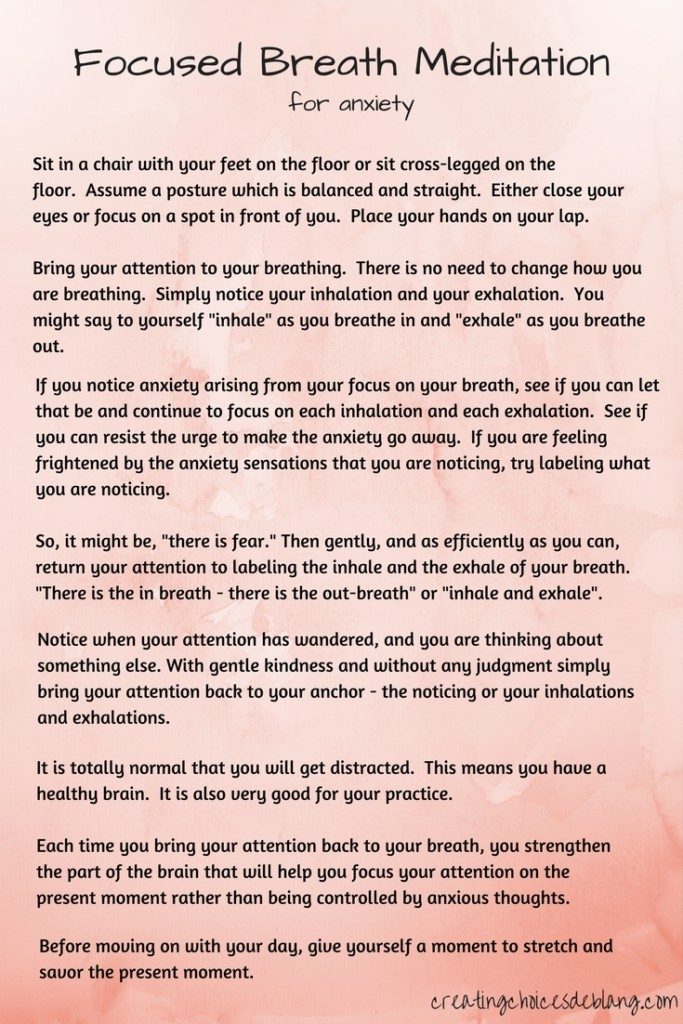It is hard to ignore the abundance of evidence demonstrating the benefits of meditation.
Just to mention a few – meditating has been shown to help with anxiety, depression, sleep, addictions, and follow-through with personal goals.
For people with anxiety just the thought of meditating can trigger anxiety.
Is that true for you?
Do you get anxious just thinking about meditating?
Is it the thought of focusing on your breath that makes your chest tight and brings on anxiety?
Or, maybe it is all that anxious thinking that you find hard to control.
 For me, some years ago, the very thought of sitting in one place, cross-legged with a straight back and focusing on my breath was enough to bring on anxiety.
For me, some years ago, the very thought of sitting in one place, cross-legged with a straight back and focusing on my breath was enough to bring on anxiety.
I’ve never been very good at sitting still and for some reason, focusing on my breath has always been hard for me. When I focus on my breath, I find it hard to breathe and then I get anxious.
And so for a long time I resisted trying meditation especially meditation which focused on my breath.
At some point, I realized that I was doing just what I encourage people struggling with anxiety not to do.
I was avoiding something that made me anxious.
And so I decided that if I didn’t want to feel like a hypocrite, I better get moving on this.
I’d like to share what I did and what I learned when I faced my fears and resistance to meditating. My hope is that it will help you to see how meditation could help with your anxiety and that it will also give you some ideas about what to do if anxiety is getting in the way of you trying meditation.
I decided to take it slowly and so, I started with a  walking meditation.
walking meditation.
I focused on my surroundings and then each time that I noticed that my attention had wandered, I gently brought it back to the trail or the trees – or to a, much younger Izzie, happily walking along with me.
Next, I practiced with sitting and focusing on music.
I chose music without words to limit my thinking  about the lyrics.
about the lyrics.
I sat any old way, and I sat. “Okay”, I thought, “I passed the hurdle of sitting still.”
My mind was busy. So many thoughts popped into my awareness – like
what I was going to do next or
what I should have done about this or that or
what I was going to have for supper.
There were days when I spent the whole time noticing that I was distracted and bringing my attention back to the music. There were days that being so distracted was frustrating.
And then there were days when I finished feeling a sense of calm that I hadn’t expected.
It wasn’t that my mind hadn’t wandered on those days. My guess is that I was less bothered by the distractions and that I was more efficient at bringing my attention back to the music.
 Next, I faced my biggest challenge – that of sitting cross-legged with an upright spine and focusing on my breath.
Next, I faced my biggest challenge – that of sitting cross-legged with an upright spine and focusing on my breath.
My fear in using my breath as the focus for meditation was that focusing on my breath would lead to my chest getting tight and feeling like I couldn’t breathe.
I expected that these feelings would get so intense that I would need to stop.
Instead, this is what happened.
I did get more anxious when I focused on my breath.
I had a definite pull to run away from that anxiety and to stop focusing on my breath. The pull was really strong.
When I noticed that pull and the rising anxiety and just keep bringing my focus back to the in and out of my breath – saying to myself “inhale” and “exhale”, a funny thing happened –
my breathing slowed,
my chest was no longer tight,
and the anxiety about breathing wasn’t there anymore.
 Instead of getting worse as I expected, those scary intense sensations related to focusing on my breathing seemed to have disappeared.
Instead of getting worse as I expected, those scary intense sensations related to focusing on my breathing seemed to have disappeared.
And guess what?
As soon as I noticed that my breathing had slowed and that I was feeling less anxious: my breathing immediately quickened; the tightness in my chest returned and the anxiety about breathing was right back there again.
Once again, I felt the pull to run away from my breath.
When my attention strayed from focusing on my inhalation and exhalation, and moved to checking on whether it was easier to breathe or whether my anxiety about breathing had lessened, all that discomfort was right there for me to notice!
“Ha, ha” I chuckle to myself. You just experienced what you preach.
My practice with breath meditation has been a mirror of the practice I encourage for anyone dealing with anxiety.
The more I paid attention to whether or not I was anxious while meditating, the more anxious about breathing I became.
The more I allowed the tension I felt in breathing to be there and kept returning to my task of focusing on the in breath and then the out breath, paradoxically, the more calm moments I experienced.
What I have learned about the tension I feel about my breath is that it subsides or fades out of my consciousness when:
- I just let it be
- when I just notice it and don’t try to change it
- when I don’t try to avoid it or run away from it.
In contrast, when I focus my attention on my worry about my breathing or even whether that tension is there or not – the tension and anxiety around breathing grows.
My attention drives my anxiety around breathing!
 What we focus on we foster or encourage.
What we focus on we foster or encourage.
When I focused on my tension around breathing while meditating, that is what I noticed, and that is what was magnified in my attention.
Meditation is a practice which helps us learn to better tolerate discomfort and how to focus our attention.
It helps us to get better at noticing when we are focusing on our discomfort and allowing it to grow in our awareness.
The same is true for anxious thoughts. When we focus on them they grow in our awareness. When we can learn to let them be and learn to shift our attention back to the present moment they most often subside and help us avoid a needless stress response. Be sure to stay tuned as I am going to write about effective worrying in a future post.
You most likely will have many anxious thoughts come up as you meditate. So, similar to my noticing the tension around breathing, the task is to notice that you are thinking and gently without any judgment bring your attention back to the focus of your meditation.
Without this skill, these random worry thoughts are likely to grab your attention and trigger an unnecessary stress response.
Meditation will help you get much more efficient at noticing that your attention has wandered and returning it to the present moment and the task at hand.
The more you meditate, the stronger this skill becomes.  It is like learning any other skill or similar to strength training in other parts of the body.
It is like learning any other skill or similar to strength training in other parts of the body.
The more you practice, the more skilled you will become at focusing your attention.
And, meditation doesn’t just help you work with your attention when you are meditating.
Think about why people go to the gym. Although it might be fun to see how much weight you can lift at the gym, most people go to the gym so they can do more outside of the gym.
The same is true for meditation. The more you practice with your attention during meditation, the more skilled you will become at other times in your life.
If you are feeling too anxious to meditate, meditating may be just the ticket to help you to learn to deal more effectively with the anxiety you experience in your life.
And, remember that surprising sense of calm that I noticed after meditating?
 Meditation also triggers the relaxation response in the body a term that Herbert Benson, M.D. of Harvard Medical School coined when studying meditation way back in the 60’s.
Meditation also triggers the relaxation response in the body a term that Herbert Benson, M.D. of Harvard Medical School coined when studying meditation way back in the 60’s.
Spending some time in the relaxation response is so beneficial for anyone with an anxious temperament. Meditation is one good way to do this.
Learning to accept your anxiety, work with your attention, and to experience the relaxation response are all important skills that will give you relief from your anxiety. Meditation allows you to practice all of these!
So, are you feeling more secure about giving it a try?
Here are the basic steps.
Click here to download.
What do you think? Could you start with 5 minutes?
When 5 minutes gets comfortable, you could try 10.
Too scared to start with your breath?
How about focusing on a sound or focusing your  attention while doing an activity like walking, coloring or unloading the dishwasher? Even brushing your teeth or staring into a crackling fire can be the focus of meditation.
attention while doing an activity like walking, coloring or unloading the dishwasher? Even brushing your teeth or staring into a crackling fire can be the focus of meditation.
The important part is to get started.
Remember that your anxiety will likely show up. See if you can resist the urge to do something about it. See if you can sit with it and let it be there as you return your attention to your focus.
There is no goal other than bringing your attention back to your focus. The goal is not to be calm or to have total focus. It is normal for your attention to wander.
Some moments you might be calm and focused and many moments you most likely will not be either of these.
The goal is to be with whatever is there and to keep gently returning your focus to whatever you have chosen as the anchor for your attention.
If your anxiety is severe or you are struggling with a panic disorder, you might find it helpful to get some support from a therapist or counselor as you try this. Be sure to look for a counselor with experience in working with anxiety.
I hope this has been helpful for you!
For more information on the Relaxation Response visit: http://www.relaxationresponse.org/



0 Comments